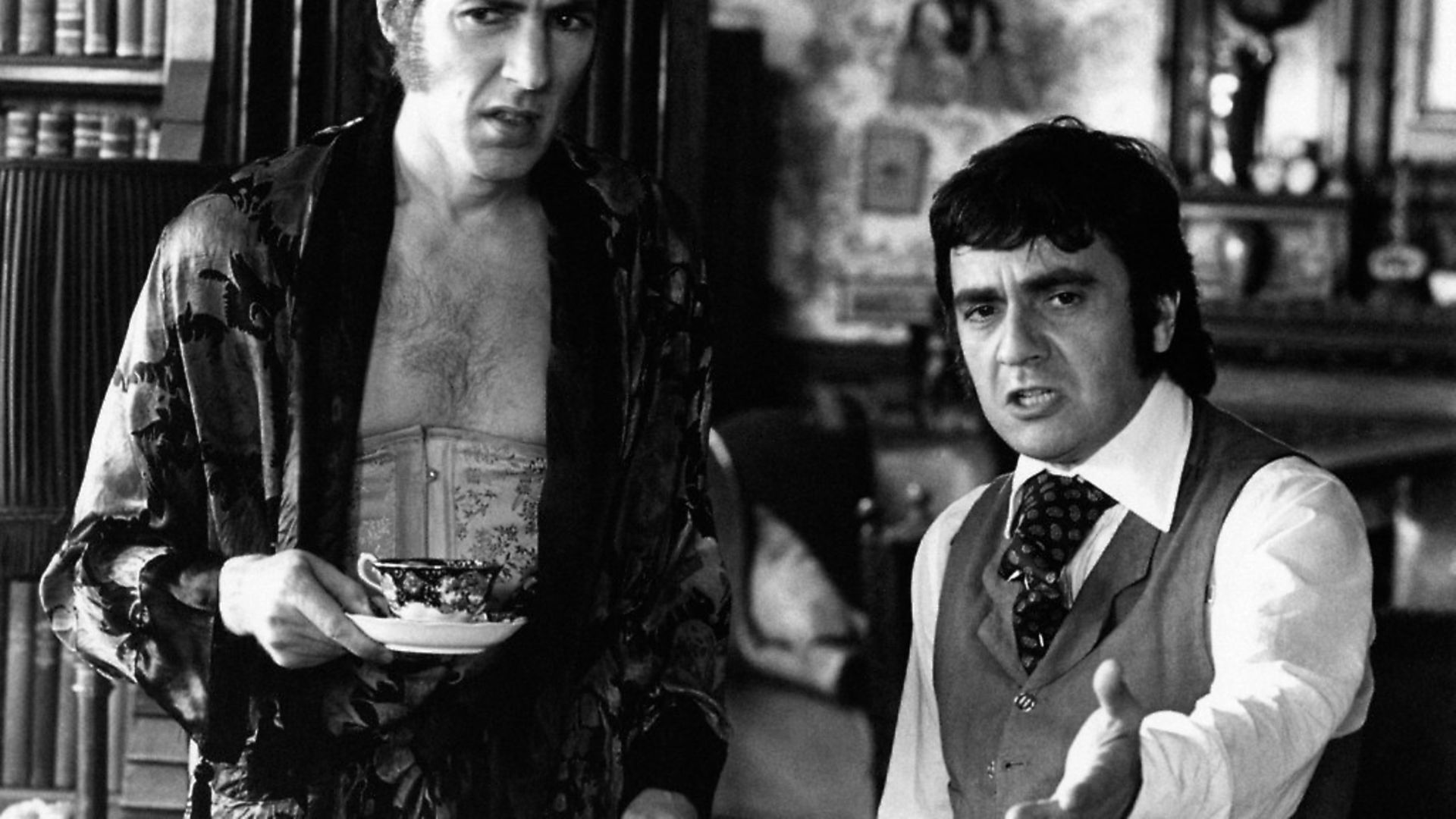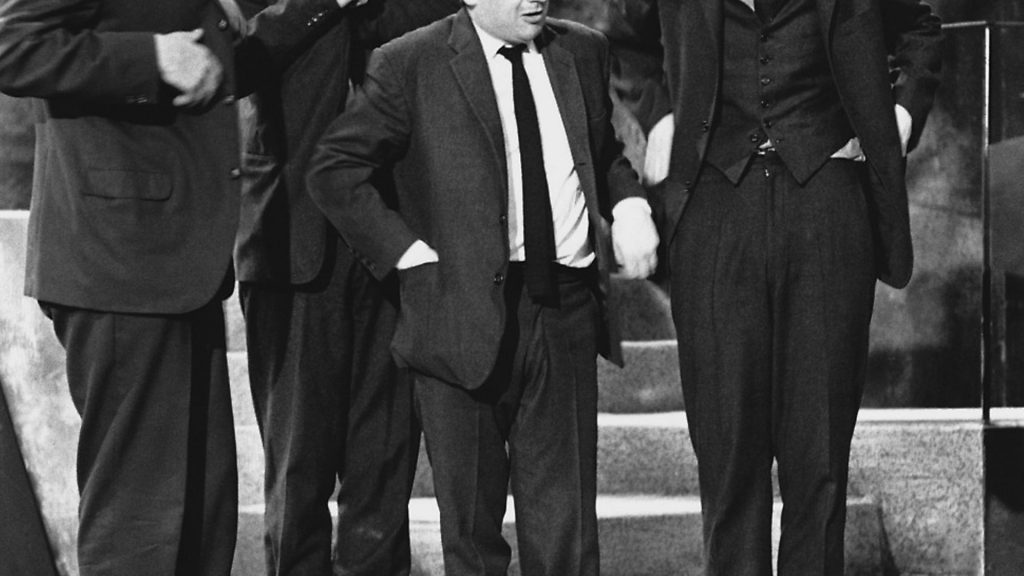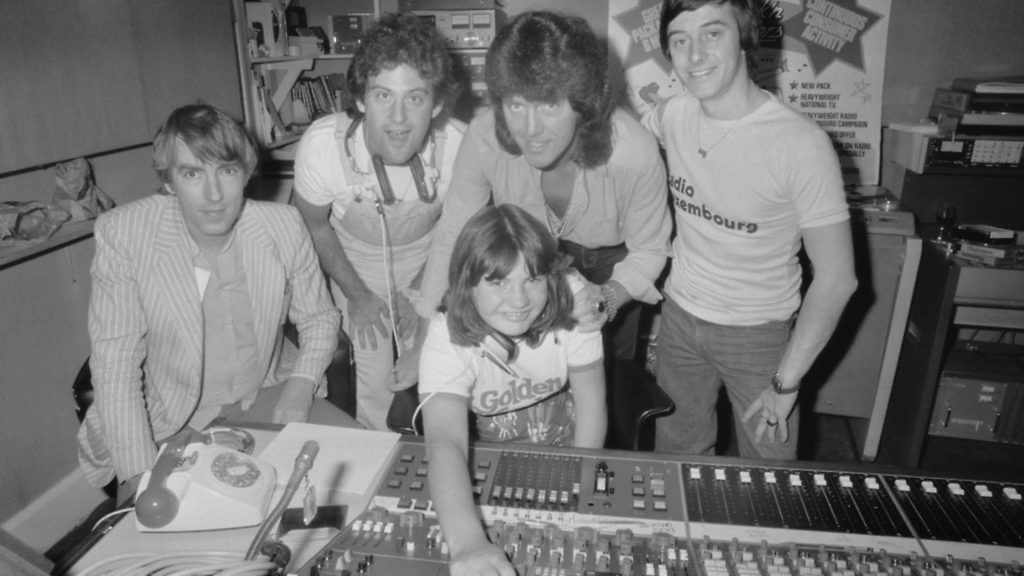
On the 25th anniversary of the comedian’s death, RICHARD LUCK evaluates his varied film career, in which he eventually found his niche.

Of course, the problem with Peter Cook was that he didn’t really do much in his later life. You know, other than recording five Derek and Clive albums with Dudley Moore. And selling out venues the world over in Behind The Fridge (aka Good Evening), the revue he wrote and performed with Dud. Just that then… and A Life In Pieces and Why Bother?, the acclaimed radio series in which he appeared as the demented but debonair Arthur Streeb-Greebling opposite Ludovic Kennedy and Chris Morris respectively.
Okay, and there were those eye-catching cameos in the first episode of The Black Adder, the Comic Strip’s Mr Jolly Lives Next Door and One Foot In The Algarve, plus his bravura turn on Clive Anderson Talks Back and the way he rolled back the years when asked to host Channel 4’s Saturday Live. And the award-winning ITV special Peter Cook & Co. Oh alright, and he was the voice of Viz’s Roger Mellie (the man on the telly) and he starred in two series of the CBS sitcom The Two of Us. All that aside, Peter Edward Cook was the epitome of underachievement.
With the triumphs of Beyond The Fringe and Not Only… But Also, the founding of the Establishment Club and the rescue of Private Eye all coming before his perceived fall from grace, the remarkable thing about the postlapsarian Peter Cook is that he managed to accomplish so much when apparently doing so little. Just look at his movie career, considered a joke in some quarters but impressive at least in terms of output.
Indeed, between 1964 and his death on January 9, 1995, at the age of 57, Cook appeared in 18 feature films. Of these, four featured him as the lead or co-lead while five saw him credited as either writer or co-writer.

A quick whizz through his big screen career shows what fame and success meant to Cook at different stages of his career, while also illustrating how, depending on the year and the production, a role in a feature film could represent either a life preserver or a means of accessing the A-list.
Though he can be briefly glimpsed in the Hardy Kruger vehicle Bachelor of Hearts (1958) and he appeared in a few TV projects – most notably playing the Mad Hatter for his Beyond The Fringe colleague Jonathan Miller in Alice In Wonderland (1966) – Cook arrived on the silver screen to considerable fanfare and in the most impressive of company. Directed by Bryan Forbes, The Wrong Box (also 1966) saw Pete and Dud cast as scheming brothers keen to get their hands on the proceeds from a tontine, a scheme in which the spoils go to the last surviving participant.
Based on a lesser work by Robert Louis Stevenson, The Wrong Box’s cast resembled a Who’s Who of British acting greats. Ralph Richardson, John Mills, Michael Caine, Peter Sellers, John Le Mesurier, Irene Handl, Leonard Rossiter – the biggest names of today and yesterday were on hand, as were a young Nicholas Parsons, a positively boyish Jeremy Lloyd and an uncomfortable looking Tony Hancock.
As for our heroes, it’s Dudley that appears more at home on screen while Pete looks more like a movie star. Little though there is to suggest that glittering film careers lay in wait, Columbia Pictures were sufficiently impressed to offer Cook and Moore a three-movie deal. Not only that but Singin’ In The Rain’s Stanley Donen had been in touch, desperate to work with the pair on the first of these projects.
Donen, a man who’d never before put out feelers in this manner, not even to Gene Kelly, was determined to collaborate with the current kings of British comedy. And the project? A fresh take on the Faust story was all the sense he could get out of Pete…
Had Peter and Dudley had their way, 1967’s Bedazzled would’ve been named after their co-star Raquel Welch – the tagline ‘Peter Cook and Dudley Moore in Raquel Welch’ had a certain ring to it. The story of a hapless burger flipper (guess who?) who sells his soul to the Devil (ditto) in the hope of winning the heart of his vapid co-worker (Eleanor Bron), Bedazzled represented Cook’s best shot at establishing himself in the world of cinema.
Like the great theatre and television comics of the past, he seemed to think he wouldn’t have made it until he’d proved himself on film. To this end, he took sole writing credit (Dudley had to made do with a ‘story by’ disclaimer) and gave himself every opportunity to shine on screen – in the guise of pop star Drimble Wedge, he’s the acme of cool and every bit as pretty as his female co-stars.
But while the best set-pieces and the finest lines are Cook’s (“You realise suicide’s a criminal offence. In less enlightened times they’d have hung you for it”), Bedazzled sees him acted off the screen by Dud.
Perhaps because he has less to work with, Moore has to give more of himself in order to win the sympathies of both the woman of his dream and the audience. A movie star he ain’t – not yet, at least – but he seems far more engaged with the material, a strange occurrence given that so little of it was his.
A cult success rather than the box-office smash Stanley Donen was hoping for, Bedazzled was where Cook and Moore’s movie careers began to diverge. Sure they’d trot out their upper-class twits act for Monte Carlo Or Bust! (1969) and they’d guest star in the Spike Milligan-scripted The Bed Sitting Room (also 1969). But while Moore already had a solo hit to his name – 1968’s 30 Is A Dangerous Age, Cynthia – Cook would follow up a dire straight turn in A Dandy In Aspic (also 1968) with the project that killed his movie star dream stone dead.
The Rise And Rise Of Michael Rimmer (1970) was the brainchild of David Frost, the man whom, depending on your point of view, rose to high estate through homaging to Peter Cook or by flat-out stealing his act. For while Pete, Dud and the rest of the Beyond The Fringe team were going down a storm on Broadway, Frost – in the year below Cook at Cambridge – established himself as the king of British satire via That Was The Week That Was.
Given the somewhat fraught nature of their relationship, it was rather amusing that Frost not only hired Cook to star in Michael Rimmer but also asked him to contribute to the script – his co-writers included two of his co-stars, John Cleese and Graham Chapman.
In return for such generosity, Cook proceeded to turn the title character – an opinion pollster who rises without trace to become Britain’s first dictator – into a parody of Frost. Apparently the future Sir David didn’t care much for Cook mimicking his catchphrases and bearing his trademark clipboard. The critics, meanwhile, didn’t care for the fact that, though Cook looked every part the movie star, he didn’t appear to have a clue how to act on the big screen.
“I think he was a strange actor,” Moore remarked in the wake of Cook’s death. “He was very awkward with other people’s lines.” Since Cook had a hand in writing Michael Rimmer, you might assume this ensured a quality performance. But as Mel Smith observed, “Peter was doing the lines and getting through the plot but he always seemed slightly removed from the movie. It was like a Brechtian technique all of its own. It’s a very unusual technique to watch on film – it’s not a film acting technique at all.”
Indeed it isn’t and whatever the movie’s merits, you can’t escape the feeling that Michael Rimmer would’ve been a more accessible film had Cleese or Chapman played the title role. Either way, the short and not terribly happy era of Peter Cook: Movie Star was over.
So began his career in movie cameos. Having both nurtured the talent of Barry Humphries and co-created the character for Private Eye, it’s perhaps no great surprise that Cook is actually rather good in The Adventures of Barry McKenzie (1972) – according to Humphries, the credit for Cook’s performance is attributable to his being a**ehole throughout. He was similarly refreshed throughout the years of touring Behind The Fridge/Good Evening with Dud, during which he found time to appear in the John Candy kidnap comedy Find the Lady (1976).
His alcoholism having compromised their working relationship, Cook bade farewell to Moore via the bizarre medium of 1978’s The Hound Of The Baskervilles in which they play Holmes and Watson respectively, while former Andy Warhol cohort Paul Morrissey holds the reins.
Made stranger still by the director’s insistence that Pete and Dud re-enact classic sketches like One Leg Too Few, Baskervilles was considered by co-star Kenneth Williams to be the worst film ever made. He had a point.
The following year, Cook and Moore recorded Derek and Clive Get the Horn, a fantastically foul-mouthed concert movie, albeit one whose audience comprises Richard Branson, Cook’s pregnant second wife Judy, Highlander director Russell Mulcahy and an inflatable woman. Moore would then jet off to Hollywood and bona fide movie stardom. Peter, meanwhile, headed back to Hampstead and a fresh round of minor roles in films either underwhelming – the 1983 Graham Chapman vehicle Yellowbeard – and utterly appalling – 1984’s Supergirl.
By now it was quite clear that, though he couldn’t carry a film, Cook was good value as a performer if you needed him for just a couple of scenes. Besides fun turns as John Watson’s publisher in Without a Clue (1986) and the speech-impedimented preacher in The Princess Bride (1987) – “Mawage is wot bwings us togeder today” – Cook proved particularly superb in Whoops Apocalypse (1986) playing Sir Mortimer Chris, a prime minister convinced unemployment is caused by pixies.
What was also now evident was that Cook wasn’t quite as flush as he used to be. According to Harry Thompson’s excellent Cook biography, the mid-to-late 1980s saw him draw a salary from Private Eye for the first time since taking over the magazine. Penury might also account for our man showing up in turkeys like Randal Kleiser’s Getting It Right and the Jerry Lee Lewis biopic Great Balls Of Fire! (both 1989).
Cook’s movie career ended on something of a high, though. In Black Beauty (1994), he looks every bit to the manor born as Lord Wexmire. That Lady Wexmire was played by his old friend and Bedazzled co-star Eleanor Bron made this farewell to film fonder still.
Of course, a polite cameo can’t compensate for the fact that Cook left us far too early. What can be said about his life on screen is that, rather like his hero Elvis Presley, the fact he found the time to appear in so many pictures is amazing given that movies were by no means his principal concern.
Speaking of Presley, Cook also fancied himself a singer and insisted that each episode of his short-lived chat show Where Do I Sit? end with him belting out a number. As you might have guessed, as a singer, Cook made a bloody fantastic actor, but that’s not really the point. Movies – like music – were something he clearly enjoyed. Enjoying his enjoyment is a gift that will outlive us all.
In closing then, Peter Cook as movie actor was far from a mawage made in heaven. Still, it wasn’t the worst job that he ever had…









